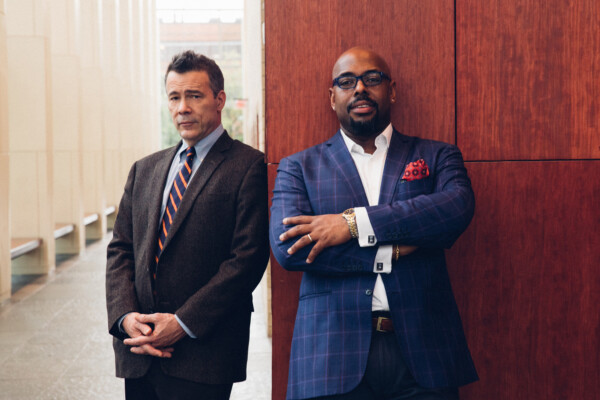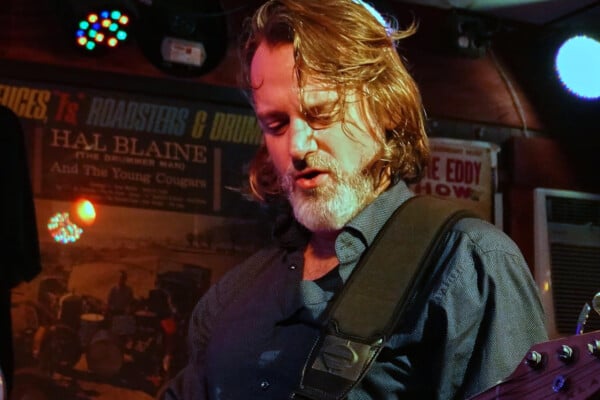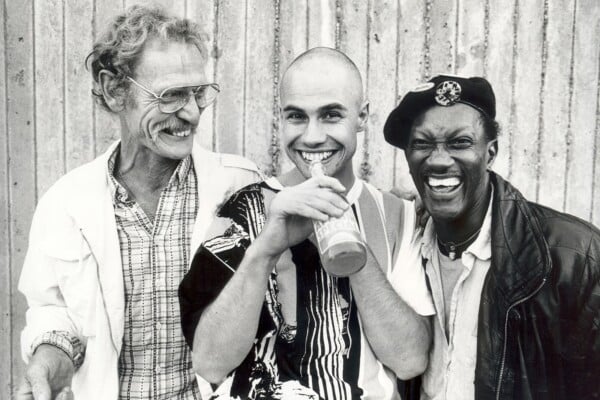Get Low: An Interview with Lucas Warford
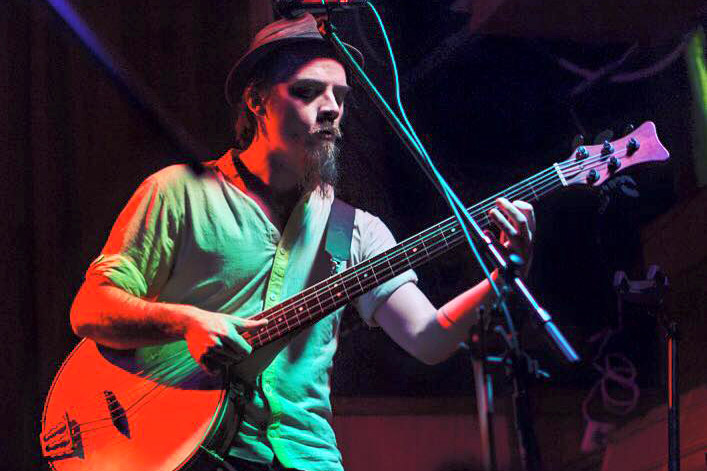
I’m always interested in unique characters that play the bass, so when I read that Lucas Warford was described as “the acid baby of Tom Waits and Les Claypool,” I was sold. One listen to his band Three for Silver backs up that portrayal.
Warford’s unique style isn’t just an act. He thrives on creativity and making his visions come to life. That’s evidenced by his arsenal of basses including the contrabasin (a washtub upright bass), a five-string banjo bass, and a resonator bass. Each plays a special role in his music by providing inspiration and a wide tonal palette.
We caught up with Warford to get the scoop on his musical background, his basses, and Three For Silver’s new song “Get Low”.
How did you get your start on bass?
I started playing bass in college, but it didn’t become my main performance instrument until Three For Silver got going. I played a lot of gypsy jazz guitar growing up, and I gravitated to the bass due to its percussive possibilities, and also that old stereotype that nobody needed another shredding guitar player, but everybody needed a great bass player. I found that to be very accurate about the gigging world, especially when I was a full-time sideman.
How do you feel being in the Portland music scene has shaped your style?
Being in Portland has led me to meet all the musicians and luthier collaborators that have allowed me to further my crazy bass dreams. Portland seems to have become a kind of destination city, and it can be hard to pinpoint just what the music scene or music culture is, but it’s definitely bursting with very talented people. I’ve come up playing alongside a lot of hardworking performers, staying on the road, doing 200+ shows a year, and that’s been very formative.
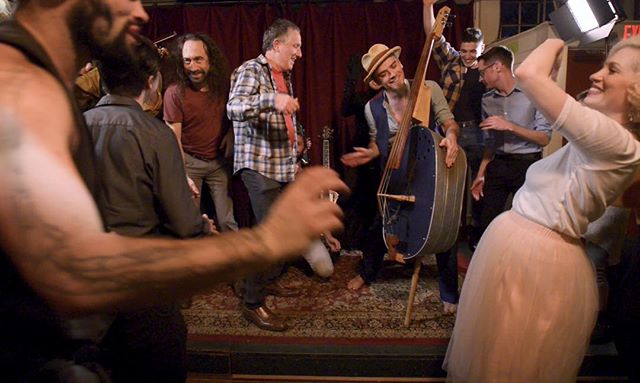
How did you come up with the ideas for your Contrabasin, bass banjo, and resonator bass? Could you explain the process for each?
Well, I certainly didn’t invent the raw idea for any of them. Though rare, all those instruments are already kicking around in the world to some extent. My main contribution, I think, is just trying to take them further, to become a true bass version of those instruments. My main frustration in the other kinds of bass banjo or resonator basses that I saw was that they just seemed like electric bass necks slapped onto weird bodies, and the people playing them were pretty much just doing what they would do on an electric bass.
I wanted to create a version that was some much their own thing that they required their own approaches and playing styles.
I think I’m starting to get there, but it’s always an evolution.
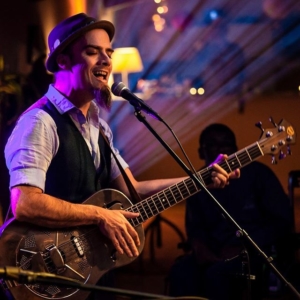 The banjo bass and resobass came out of a desire to take the percussive electric bass style and have it make sense within the sort of music I like to make (weird dark folk music? I don’t know). Both the banjo and resonator are inherently twangy and percussive, plus I’d of course seen Les Claypool playing and recording on his, but I felt the idea could go way farther.
The banjo bass and resobass came out of a desire to take the percussive electric bass style and have it make sense within the sort of music I like to make (weird dark folk music? I don’t know). Both the banjo and resonator are inherently twangy and percussive, plus I’d of course seen Les Claypool playing and recording on his, but I felt the idea could go way farther.
Ed Davies and I designed the bass banjo. He’s a brilliant bass luthier who I think is currently hiding somewhere in Montana. We took a very traditional banjo design and enlarged it by about 1/3, we wound up with a 14” pot and the longest possible scale length that I could reasonably play fretless on (39″) to try and maximize the low-end resonance. I think it’s been pretty successful, also the tone I get when bowing it is one of those beautiful accidents. We certainly didn’t think about bowing it during the design or construction, but once I put a bow to it that became a regular part of its sound.
The resonator was a continuation of that same theme: How to make folky acoustic basses that are their own thing, not just bastardized electrics. I went straight to the big dogs (National) and to my continuing luck, they were interested in working with me. At least tentatively. I had to bring my basses into their workshop in San Luis Obispo and do a little impromptu concert, showing them what my style was all about. To their credit, they hadn’t built such an instrument before because they didn’t think it would make much sense for someone just to be approaching it like a regular bass. I showed them how I play and what I had in mind and it was a green light from there. To further set the tone of the resobass apart I keep it in a CGCGC tuning (the low C being just above the traditional B on a 5-string), I think this tuning really opened up the droning bluesy harmonic rich resonator tone I was searching for, and also allows for fingerings and patterns that would be unlike in a regular BEADG tuning.
The contrabasin is an ongoing project between myself and Tom Fenallosa, an old friend and fellow band member from back in the day. The tub started out as a way to make an easy traveling bass on the cheap but has now morphed into a whole other world of playing possibilities (but is still a cheap traveling bass, haha). The metal body and plywood top encouraged me to start fitting in extra bits of percussion where could, slowly evolving to where I am now. I’d destroy a regular upright if I were to do it on there. I literally beat cracks in the metal tub, and we replace it every year so.
How do your unique instruments affect the way you write music?
They are a massive part of the latter stages of songwriting, once I’m thinking of actually recording or performing. I tend to start with chords and lyrics, and those can come out on anything. Recently I’ve spent a lot of time playing mandolin, it’s kinda become my go-to “messing around with an idea” instrument as it’s small, portable, and I find 5ths tuning is really helpful for finding interesting chordal ideas. But over the years that messing around instrument has also been guitar or piano or tenor banjo or whatever’s around.
After I’ve got a solid working idea of the song it’ll start moving around in different basses, finding a home. Songs tend to settle into one, but they can move around over the years. Each bass has a radically different voice, and it’s always exciting to see which basses sing each song best. The bass banjo is mellow and dark and prefers slower tempos, the contrabasin is great when something needs a lot of rhythmic drive and punch, the resobass is the most versatile but always the go to when I need to get really technical.
Do you use alternate tunings? How did you choose those?
I keep my electric basses in EADGC, I originally picked that tuning for bass banjo, but I like it so much it has spread to the others. The high C just really helps the chords pop.
The resobass is in CGCGC as I talked about above. This is my current favorite set up and lets me think a bit in 5ths while also having instant access to these massive doubling or tripling or octaves. It’s quite handy for chords, and with a capo, I can maintain that fascinating resonating drone. Does anybody make a bass capo? Currently, I’m using a 12-string guitar cap, it seems to work. The contrabasin is regular upright EADG.
Do you still play traditional-styled basses and/or gigs?
I have a regular electric and also a frankensteined hollow body fretless electric that I bust out whenever needed. I don’t currently have a regular upright, which is frustrating. In terms of “traditional” style, I’m more likely to be found subbing for somebody on upright bass. I always love slapping away on a gypsy jazz gig, or Balkan gig, or old school rock and roll.
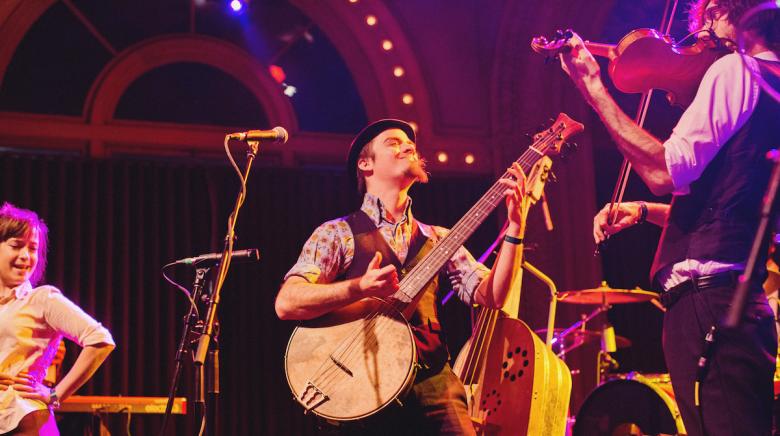
I dig “Get Low” and the video. What is the inspiration for the song? Why did you want to record the video in The Mississippi Pizza Pub?
Thanks! The song was originally inspired by some sections of the Tao Te Ching (specifically the Ursula K LeGuin translation) extolling the virtue of those who stay low to the ground and lead from behind (which when I write it like that makes me think there might be some good wisdom there for bass players in general, haha). This crossbred with some lyrics I was already kicking around, a kind of anthem for the disenfranchised, which I realize sounds pretentious, but who cares – that’s the way it went down. Just trying to capture that feeling of “[forget] climbing the ladder, [forget] illusory success, just go straight to the bottom and see what you find.”
The Pizza Pub is my favorite venue in Portland. It’s the first place that ever gave me and the band a stage, and it’s one of the only true homes for grassroots local music in Portland. They don’t [care] about looking cool or being hip, they just give a stage to local musicians and treat them well. There are some other great venues in Portland, but the Pizza Pub is always our first home.
Three For Silver gearing up for a European tour next month. How do you set that up as an independent band without a booker or manager?
Though we are independent in that we don’t have the assistance of a formal label or manager, we do work with bookers when it’s a good fit. In America, I still do 99% of our booking (which I presume is why you never see us at any festivals, haha), but in Europe, we’ve been working with ROLA Music. It’s a small crew of people who in my experience work really hard and do really well by the musicians they sign. I’m always excited to partner with people who care about the music and do a great job.
What tips do you have for touring musicians?
Stay on the road. Play shows. Play everywhere you can, especially the street corner, especially places people won’t expect you to turn up. The world always needs more live music and less recorded music.

